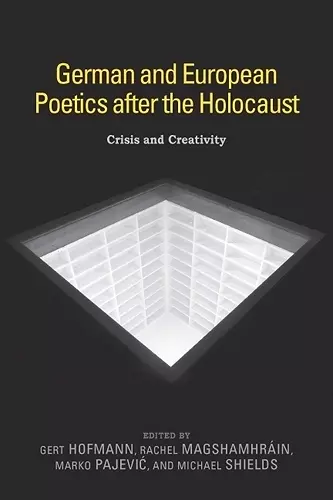German and European Poetics after the Holocaust
Crisis and Creativity
Gert Hofmann editor Marko Pajević editor Rachel MagShamhráin editor
Format:Hardback
Publisher:Boydell & Brewer Ltd
Published:20th May '11
Currently unavailable, and unfortunately no date known when it will be back

New essays on poetical and theoretical responses to the Holocaust's rupture of German and European civilization. Crisis presents chances for change and creativity: Adorno's famous dictum that writing poetry after Auschwitz would be barbaric has haunted discourse on poetics, but has also given rise to poetic and theoretical acts of resistance. The essays in this volume discuss postwar poetics in terms of new poetological directions and territory rather than merely destruction of traditions. Embedded in the discourse triggered by Adorno, the volume's foci include the work of Paul Celan, Gottfried Benn, and Ingeborg Bachmann. Other German writers discussed are Ilse Aichinger, Rose Ausländer, Charlotte Beradt, Thomas Kling, Heiner Müller, and Nelly Sachs; concrete poetry is also treated. The final section offers comparative views of the poetics of European literary figures such as Jean Paul Sartre, André Malraux, and Danilo Kis and a consideration of the aesthetics of Claude Lanzmann's film Shoah. Contributors: Chris Bezzel, Manuel Bragança, Gisela Dischner, Rüdiger Görner, Stefan Hajduk, Gert Hofmann, Aniela Knoblich, Rachel MagShamhráin, Marton Marko, Elaine Martin, Barry Murnane, Marko Pajevic, Tatjana Petzer, Renata Plaice,Annette Runte, Hans-Walter Schmidt-Hannisa, Michael Shields, Peter Tame. Gert Hofmann is a Lecturer in German, Comparative Literature, Drama, and Film and Rachel MagShamhráin is a Lecturer in German, Film, and Comparative Literature, both at University College Cork; Marko Pajevic is a Lecturer in German at Queen's University Belfast; Michael Shields is a Lecturer in German at the National University of Ireland, Galway.
[A] thorough and thoughtful engagement with poetological developments after the 1945 rupture (or lack thereof) and an excellent source of in-depth, nuanced readings of Adorno . . . . [T]he editors are to be congratulated on raising timely (perhaps too timely?) and important questions, even if all of the answers to these questions are not (yet) forthcoming. * MODERN LANGUAGE REVIEW *
Highly recommended. * CHOICE *
ISBN: 9781571132901
Dimensions: unknown
Weight: 634g
318 pages